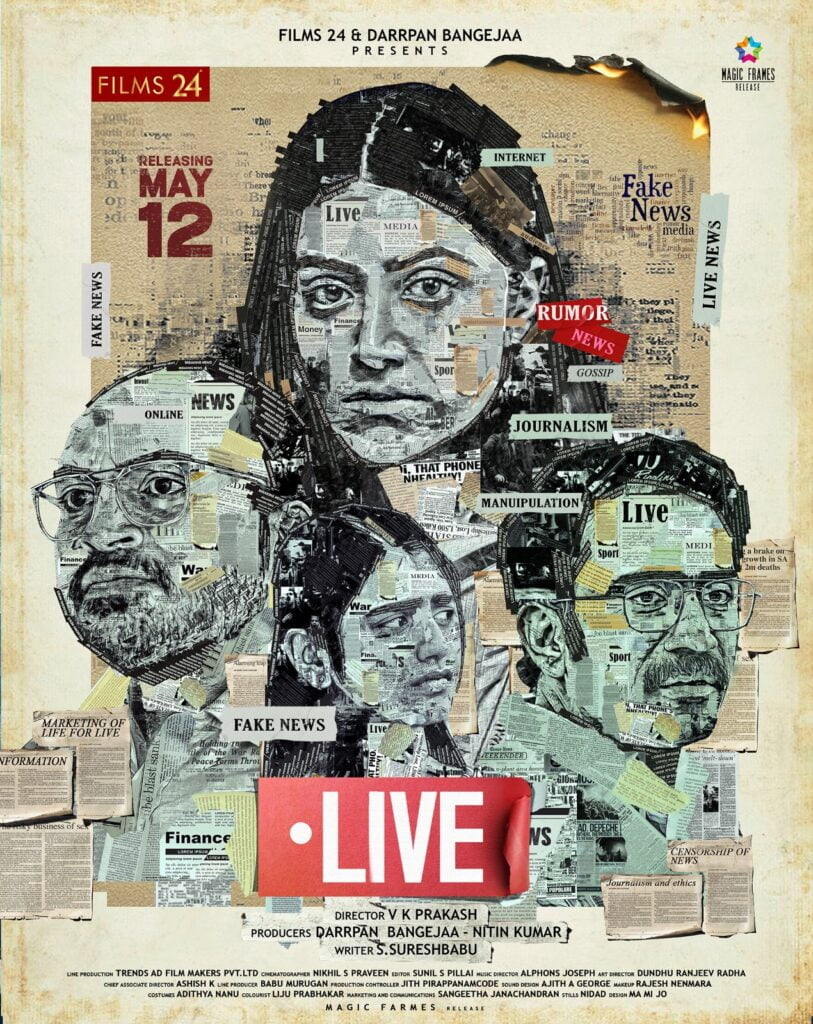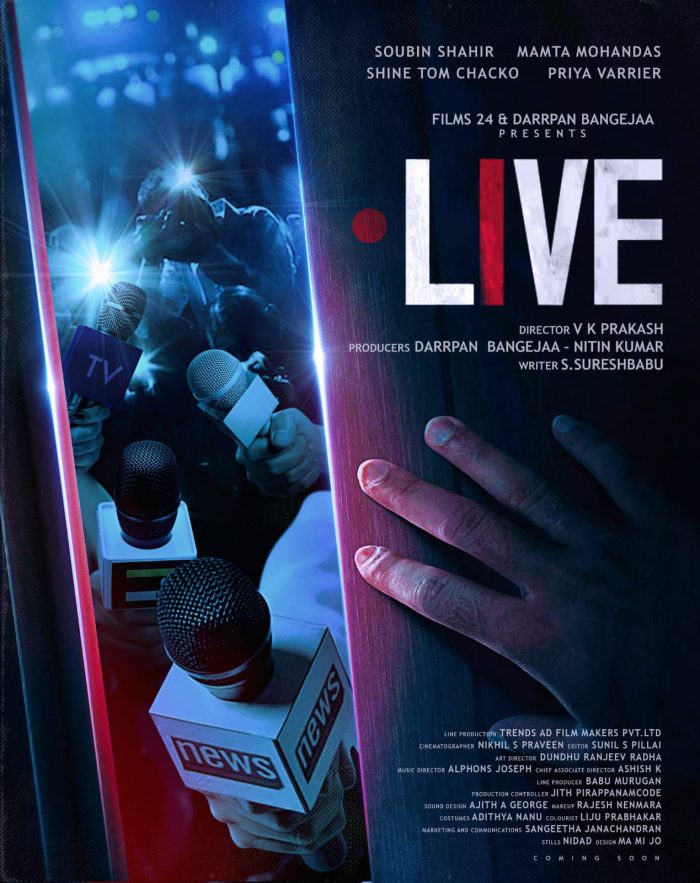Spoiler Alert: This is a review of the film ‘Live’.
Trigger Warning: This article mentions suicide and harassment.
The underlying ideas of sensitive information and news are ingrained in the theories of accurate communication as well as the concepts of truth. However, in the past few years, social media has redefined the structure, scope, and complexity of the news, so now it is easier for fake news to disseminate and more likely to deceive readers.
Tackling a pertinent issue
A current global trend is the manipulation of search engines and social media algorithms to deceive news consumers and reach big audiences. It is now fairly usual to see fake videos, news articles with morphed media logos, bots, and hired commentators for a favourable online reputation (troll farms).
The Malayalam film Live delves into the pressing issues of cyber harassment and fake news, shedding light on their impact on individuals’ lives. Set in Kochi in 2018, the movie explores the psychological complexities of those affected by online harassment and the far-reaching consequences of false information spread through media.
Based on this, the Malayalam film Live delves into the pressing issues of cyber harassment and fake news, shedding light on their impact on individuals’ lives. Set in Kochi in 2018, the movie explores the psychological complexities of those affected by online harassment and the far-reaching consequences of false information spread through media. It brings attention to the need for society to address these the Malayalam film Live delves into the pressing issues of cyber harassment and fake news, shedding light on their impact on individuals’ lives. Set in Kochi in 2018, the movie explores the psychological complexities of those affected by online harassment and the far-reaching consequences of false information spread through media. It brings attention to the need for society to address these concerning phenomena.
The film revolves around Dr. Amala Sriram, portrayed by Mamta Mohandas, and her experience with a persistent stalker. Soubin Shahir plays the role of Sriram, her husband, who initially shows little concern for the situation. The stalker continuously harasses Amala, sending her pictures during work and bombarding her with messages from different phone numbers.
Missed opportunities in narrative execution
The film introduces another character, Anna, portrayed convincingly by Priya Varrier. Anna is an ambitious student with aspirations of becoming a doctor. She becomes a victim of fake news, with the spread of false information tarnishing her reputation. Due to monetary motives, the media has changed its primary purpose of reporting events that actually occurred into covering enthralling and contentious problems as news stories.
Live explores the consequences of this false news and the subsequent lack of justice. While Anna’s character is well portrayed, the film fails to effectively depict the struggle faced by the characters, relying heavily on music at inopportune moments and dialogue rather than utilising visual storytelling techniques. This missed opportunity prevents the narrative from fully engaging the audience and leaves the resolution feeling incomplete.

Throughout the film, the characters face numerous challenges in their fight against cyber harassment and fake news. They attempt to reframe the news and provide moral support to Anna, but their efforts prove futile. Rebecca West’s words, “I only know that people call me a feminist whenever I express sentiments that differentiate me from a doormat,” adds depth to the film’s exploration of gender dynamics. However, at times, the film becomes too heavy-handed with its messaging, lacking subtlety in its delivery.
The potential for certain algorithms to produce “news loops”—also referred to as “echo chambers”—in which the same information is repeatedly shown to viewers is another factor contributing to concerns about internet sensationalism. These strategies have allowed many online personas to make money by sowing fear using entirely illogical and unreliable sources that can spread online thanks to these algorithms which have been accurately depicted in the film.
As controlling the limits of what is acceptable to say becomes more difficult, the idea of “clickbait” has become a prominent part of the global lexicon and has had an impact on many significant world events. The potential for certain algorithms to produce “news loops”—also referred to as “echo chambers”—in which the same information is repeatedly shown to viewers is another factor contributing to concerns about internet sensationalism. These strategies have allowed many online personas to make money by sowing fear using entirely illogical and unreliable sources that can spread online thanks to these algorithms which have been accurately depicted in the film.
As the situation worsens, Anna decides to relocate to Kanyakumari to escape the relentless harassment and media frenzy. (Spoiler) Tragically, Anna and her grandfather choose to end their lives, illustrating the severe impact of cyber harassment on individuals. This turn of events is shocking and emphasises the devastating consequences that can arise from such situations.

Without spoiling the intricacies of the ending, it is safe to say that the film leaves viewers with a sense of suspense and a desire for justice to prevail. The ending of the film provides a momentary catharsis but falls short of providing a cohesive narrative and a strong climax that could have left a lasting impression on the audience.
Inconsistent characterisation and performances
One notable flaw in the film is the inconsistent characterisation, particularly with Amala’s husband. At the end, he takes it upon himself to confront another stalker, highlighting his evolving stance on protecting his wife. His contradictory actions towards the end of the story lack clarity, leaving the audience perplexed about his sudden change in behaviour. Additionally, the performances by Soubin Shahir and Mamta Mohandas, who portray the main characters, are not particularly remarkable, failing to elevate the impact of the story. This lack of exceptional acting further weakens the overall impact of the film.
Highlighting the importance, despite shortcomings
Despite its shortcomings, Live deserves recognition for raising awareness about the significant issues of cyber harassment and fake news. By emphasising the need for society to address these problems, the film serves as a reminder of their severity and the devastating consequences they can have on individuals. It highlights the urgency to find effective solutions and prevent the negative impact of these phenomena on people’s lives.
In a world driven by technology and rapid information sharing, it is more crucial than ever to address the pressing issues of cyber harassment and fake news. Live may have missed the mark in its execution, but it serves as a reminder of the real-life consequences these problems can have on individuals and society as a whole.
In a world driven by technology and rapid information sharing, it is more crucial than ever to address the pressing issues of cyber harassment and fake news. Live may have missed the mark in its execution, but it serves as a reminder of the real-life consequences these problems can have on individuals and society as a whole.
The film prompts us to reflect on the urgent need for stricter regulations, digital literacy, and ethical journalism to combat the detrimental effects of cyber harassment and the proliferation of fake news. By actively engaging in these discussions and implementing effective measures, we can strive to create a safer and more trustworthy online environment for everyone.



